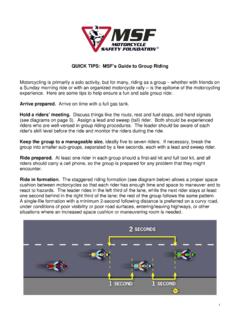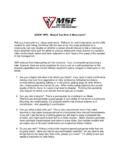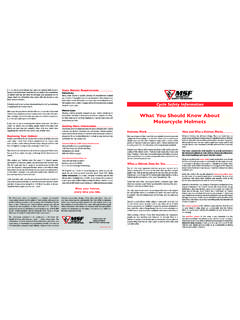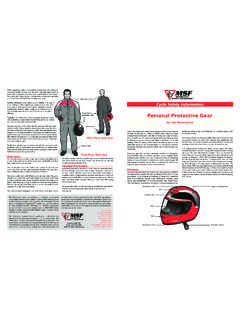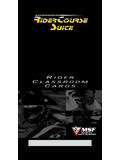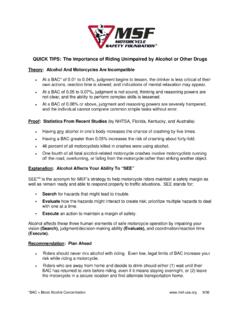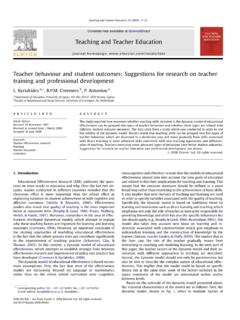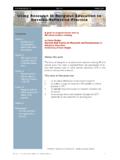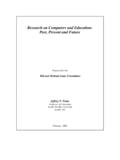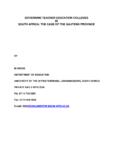Transcription of Developing the Motorcycle Safety Foundation …
1 Developing the Motorcycle Safety Foundation Rider education and training System Presented by Tim Buche, President Motorcycle Safety Foundation At the FIM/CMT 4th International Public Policy Conference 2004 Motorcycle Safety Foundation , Inc. FIM 2004 2004 Motorcycle Safety Foundation , Inc. 2 Developing the Motorcycle Safety Foundation Rider education and training System A society whose maturing consists simply of acquiring more firmly established ways of doing things is headed for the graveyard even if it learns to do these things with greater and greater the ever-renewing society what matures is a system or framework with which continuous innovation, renewal and rebirth can occur.
2 John Gardner, Self Renewal: The Individual and the Innovative Society. Introduction The Motorcycle Safety Foundation (MSF) is a national, not-for-profit organization promoting the Safety of motorcyclists with programs in rider training , operator licensing and public information. The MSF is sponsored by the manufacturers and distributors of BMW, Ducati, Harley-Davidson, Honda, Kawasaki, KTM, Piaggio/Vespa, Suzuki, Vengeance, Victory and Yamaha motorcycles . Since March 1973, the MSF has set internationally recognized standards of excellence in Motorcycle rider education and training . The MSF works with the National Highway Traffic Safety Administration (NHTSA), state governments, and other organizations such as the American Association of Motor Vehicle Administrators, the International Association of Chiefs of Police, and the National Association of State Motorcycle Safety Administrators to improve motorcyclist education and licensing.
3 The MSF is the leader in championing the Safety of the motorcyclist in many ways. The Foundation develops and maintains the highest quality, research-based rider education and training curricula, establishes national certification standards and provides technical assistance for training and licensing programs, actively participates in government relations, research and public awareness, and works in powerful partnerships with other motorcycling and public organizations toward improving and enhancing the enjoyment and Safety of motorcycling. The five primary messages for motorcyclists include 1) get and stay trained, 2) get licensed, 3) wear protective gear, 4) ride straight, and 5) ride within personal limits.
4 The Motorcycle Safety Foundation does not deal with Motorcycle design or manufacture, and its programs focus primarily on the Motorcycle operator. Late in the 1990s, MSF embarked on a significant renewal endeavor to improve the education and training processes related to motorcyclists and its certified instructors. It reinvented its entire Motorcycle Safety rider education and training system by significantly updating and improving its curricula and instructor certification programs and processes. Developed over the period of several years and continually analyzed, improved and expanded, the MSF Rider education and training SystemSM (MSF RETS) FIM 2004 2004 Motorcycle Safety Foundation , Inc.
5 3uses proven and cost-effective approaches to promote Motorcycle Safety , ensure a positive image of motorcyclists, and enable a superior riding experience. Two key curriculum components have been completed and introduced. These two curricula form the cornerstone of MSF RETS. They are the learn-to-ride Basic RiderCourseSM (BRC) introduced in 2001, and the more advanced Experienced RiderCourse Suite (ERC Suite) introduced in 2003. Additionally, a new alcohol education curriculum, called the Riding Straight Module, was released in 2003. This paper presents a snapshot of the developmental aspects of MSF RETS, lays out the template for the system s courses, training opportunities and other areas of rider development opportunities, and provides the infrastructure mechanisms to ensure vital and effective programming with continuous quality improvement and evaluation procedures.
6 MSF RETS represents a challenging yet extremely rewarding opportunity to translate a remarkable vision into a dynamic system with opportunities for motorcyclist learning, growth and renewal. It means to bring together a multitude of elements within a system, a system that blends into a cohesive whole four primary elements: a variety of programs and services, varied skill levels and motivations of motorcyclists, talent and resourcefulness of MSF certified RiderCoaches and other stakeholders, and a multitude of delivery partners who will interact with motorcyclists as well as non-motorcyclists. FIM 2004 2004 Motorcycle Safety Foundation , Inc.
7 4 Goals and Learning Principles The vision of MSF RETS is to create an education and training system embraced by the stakeholders and delivered in an effective, cost- and time-efficient manner. It is a system to enhance the human side of motorcycling, that is, to focus on the human factors related to Motorcycle Safety . The MSF RETS has four goals in achieving the mission of creating the most effective Motorcycle rider education and training system that supports an increasingly safe riding environment in which responsible motorcyclists enjoy riding to the fullest. The four goals are: Goal 1. Comprehensive Model. The MSF RETS is a dynamic program that packages education and training courses into interconnecting building blocks, each containing a specific set of core skills and competencies.
8 MSF RETS offers learning opportunities at a wide variety of levels for riders , for the community that supports RiderCoachesSM, policy makers, program administrators and allied fields, as well as providing for the emergence of new collateral markets such as international licensees of MSF curriculum products. Goal 2. Custom-Tailored for riders . The MSF RETS uses stand-alone yet interrelated modules so participants can select courses to create a personalized education and training program with instruction matched to particular interests and skill levels. Goal 3. New Opportunities for RiderCoaches. The MSF RETS enhances professionalism in rider education and training by adding opportunities for RiderCoaches and RiderCoach Trainer development and giving increased responsibility, visibility, and recognition.
9 Goal 4. Flexibility for Jurisdictions. The MSF RETS complements existing programs by offering options to respond to emerging countermeasures such as graduated licensing, rider improvement programs and online learning opportunities. The modular approach affords each jurisdiction the opportunity to design a program that is tailored to specific needs and enhance the quality of instruction participants will receive in the essential skills required for licensing. An additional benefit is that jurisdictions can expand their programs to meet increasing demands for education and training . Contemporary research has uncovered a plethora of new information related to how a person learns.
10 Theory and practice from the fields of adult education and brain-based learning are incorporated into the MSF RETS. The principles that make up the RiderCoach/learner transaction are based upon the following principles for curriculum design and facilitation: Learning occurs to the degree it is relevant and meaningful to participants. Mutual responsibility in the teacher-learner transaction is vital. Mutual respect in the teacher-learner transaction is essential. FIM 2004 2004 Motorcycle Safety Foundation , Inc. 5 Past experiences form the basis for new learning. Learning environments should be characterized by physical comfort, freedom of expression, acceptance of differences, a high challenge/low threat environment, realness, genuineness, empathy and sincerity.

